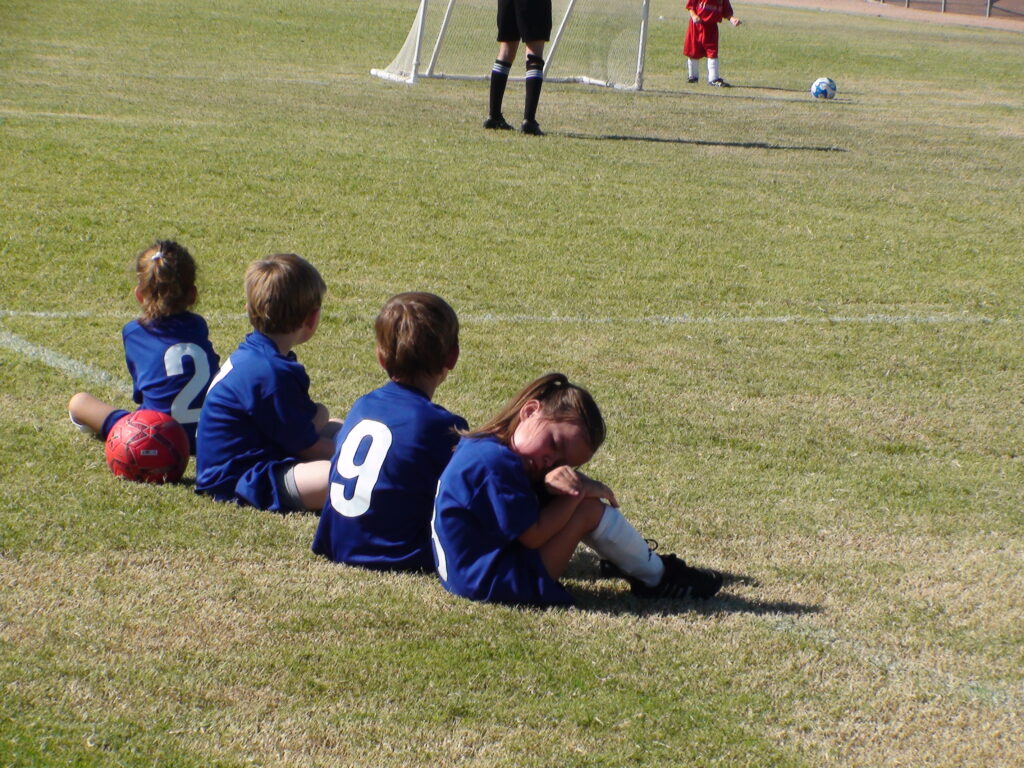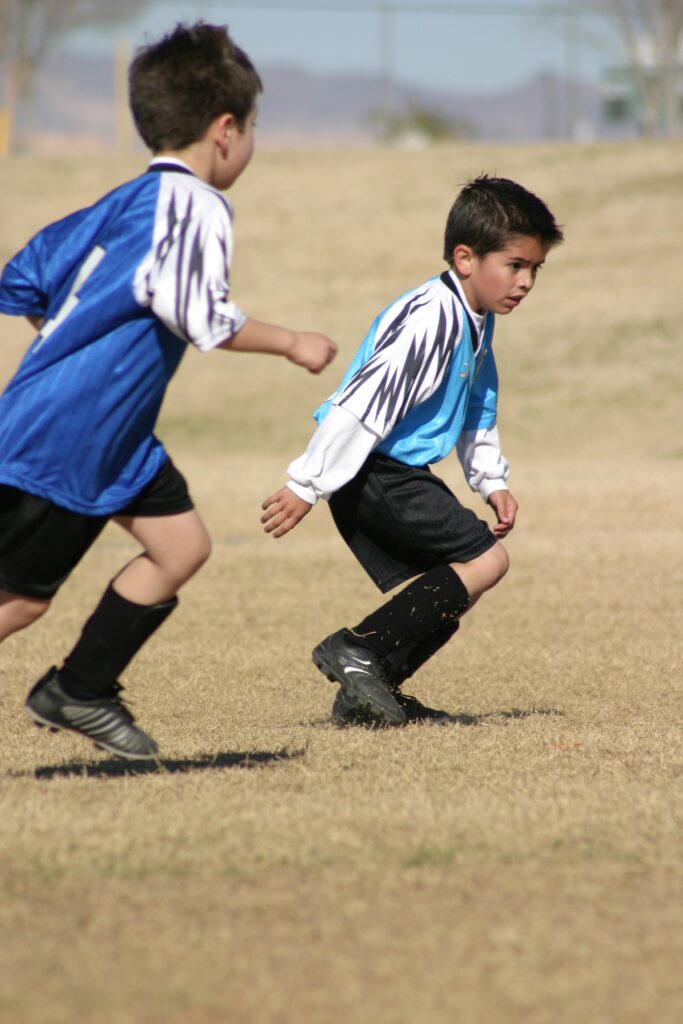The soccer season is almost over for youth soccer leagues across America.
Hoping you all had a great experience with your team and your club. That your child learned a lot and improved. That he/she continues to love the game. And if they don’t, it’s simply because it’s just not their thing.
And that’s OK too. Not everyone loves every sport, activity or hobby. No matter how much we as parents might want them to!
As a parent, I just wanted my kids to try things, embrace them, give it 100% and then decide if it brought them JOY. If it didn’t, then we helped them try something else and give the new activity a fair chance.
To be honest, the only things both my girls loved about soccer was the snacks. That didn’t last too long but they sure were cute to watch! And now in their twenties, our family still laughs and jokes about their involvement (or lack of) in soccer when they were barely bigger than the ball.

Both of my boys loved the game. They loved improving/getting better at something, their teammates and their coaches. It wasn’t all perfect but it was a great journey with plenty of highs and lows. Sometimes the low points were where they learned the most (and as it turns out improved their character and resilience by how they approached it – or better yet, how our whole family approached it). One of my boys went on to play 2 years at a JUCO program and the other had a career ending accident at the last tournament of his junior year in HS. He never was able to play again. But he adapted, found new passions and never looked back in regret (because he gave it everything when he had the chance).

So after about 30+ years combined of attending tryouts as a parent (+ over 15 years as a club coach) I wanted to share some of my reflections on youth soccer tryouts to help you be prepared for the chaos;)
Tips for preparing for tryouts
Be clear about what you are looking for in a club, in a team and in a coach
- There are clear advantages and challenges to the bigger mega clubs and the smaller community based clubs – Do your research to understand what those differences are. Not just by listening to others on the internet, by asking people who have gone through the experience but aren’t tied to a specific club, org or league anymore – you’ll get a much more objective answer than someone who is in the thick of things.
- Make sure to understand the club/team commitments – Make sure you are fully aware of the time, financial, training and travel commitments. These can often be overwhelming if you don’t know or don’t plan for them proactively. Check out a club’s website, document what is there and make a list of questions to ask your coach or better yet a club administrator. Some things aren’t posted so you may need to research & map it out yourself.
- Understand what are you looking for in a coach – Does you child need a coach who is a disciplinarian? Has the heart of a teacher? Is very hands off, let’s the players play? Is very organized and goal based?
- Understand what type of team environment works for your child – Not every child needs an Elite program (but everyone is selling that these days). Make sure you understand the basics of the youth soccer hierarchy.
- Assess the club/team requirements to your family values – does it work for you?
If you are looking to possible join another team/club then do these things
- Research local clubs, teams and coaches
- Ask around/listen to other people’s experiences but DO NOT take them at face value – Remember, people tell you what works for them which may be different from what you value. It’s so important to do your own research!
- Go watch games (unannounced), sit somewhere off to the side and analyze the environment:
- How does the team play? Do they launch it forward and press? Do they build from the back? Do they create chaos or rhythm? Do you see patterns of play? Does it look like football/soccer or rugby?
- What are the player/team dynamics on and off the field? Do they play as a team? Do they complain and retaliate when things don’t go their way? Do they compete? What does their body language tell you? Do they play with a smile on their face?
- What are the parent interactions like? Do you see and hear encouragement or blame? Do they yell/get aggressive with the referee/other team? With their own players? Does it feel super tense for a youth game? Or do they cheer for all the kids? Offer the right amount of praise? Do they model sportsmanship? Do they look like a group you might be proud to be a part of?
- How does the coach lead his/her team? Do they yell/shout instructions non-stop? Do they harass the referee? The opposing team? Their own players? Do they look more like a tyrant or a teacher? Do they exhibit a model of sportsmanship? Do you get a sense of leadership, mentorship and/or respect from their presence?
- Make sure to analyze your family’s goals and values against each possible choice for the next season
- Remember – your decision is not life/death, not pass/fail, not good/bad – it’s only what is best for your child/family at this moment in time
If you are looking to stay on the same team/club then do these things
- Don’t assume anything, race to the finish line!
- Ask your coach for feedback on how your child can improve (if your child is older, have them ask)
- Work with your child to help them generate ideas for improvement (ask them how they can get better – make it a dialogue)
- Help reinforce your child’s need to work on their own if they want to be a better player (but don’t force them or make them feel guilty – they have to do it themselves for it to work!)
At the actual tryouts
Regardless of where you tryout, make sure your kids do these things
- Show respect by looking the coach in the eye after each session and thanking him/her for their coaching/guidance
- Shake the coaches hand (or give them a fist bump!)
- Ask questions from the coaches if they need help understanding something – coaches love to see players advocating for themselves as it shows a sign of ownership and courageousness from a young player
- BE FULLY ENGAGED DURING TRYOUTS, focus on what you are doing at every moment – before, during and after the event, good coaches notice these things
- Be flexible and adaptable – sometimes coaches will have you play in a different position or in a different style. Accept the opportunity as a challenge and have fun with it!
- Give 100% effort
These were some of the attributes that helped me remember the players outside of how they played. When you have dozens or hundreds of players to assess and analyze in a short period of time, these simple demonstrations of character often made the difference to whom I would invite to a team.
Final Thoughts
Be transparent with your prospective coaches about the options you’re looking at and your “why’s”.
Assume positive intent, BUT be wary about coaches, clubs and parents that bad mouth other coaches and clubs.
Be empathetic to the coaches, they are doing a lot of work to assess and try to build teams and most of them do it for the right reasons.
We should all try and focus on the things we can control, not the things we can’t.
I know how stressful this time of year can be for families and for players. You are balancing your family’s needs and desires with teams, coaches and clubs and trying to make sense of it all. Your trying to place your child in an environment that best suits their needs to grow as a player and a person while enjoying a wonderful experience. And by the way, all the clubs seem to have their tryouts at the same time! So start your homework NOW. Be proactive and it will make this process a little bit smoother for you.
And remember, there is no right or wrong answer. There’s only what’s right for you!
Enjoy your Futbol!
Coach Eddie

